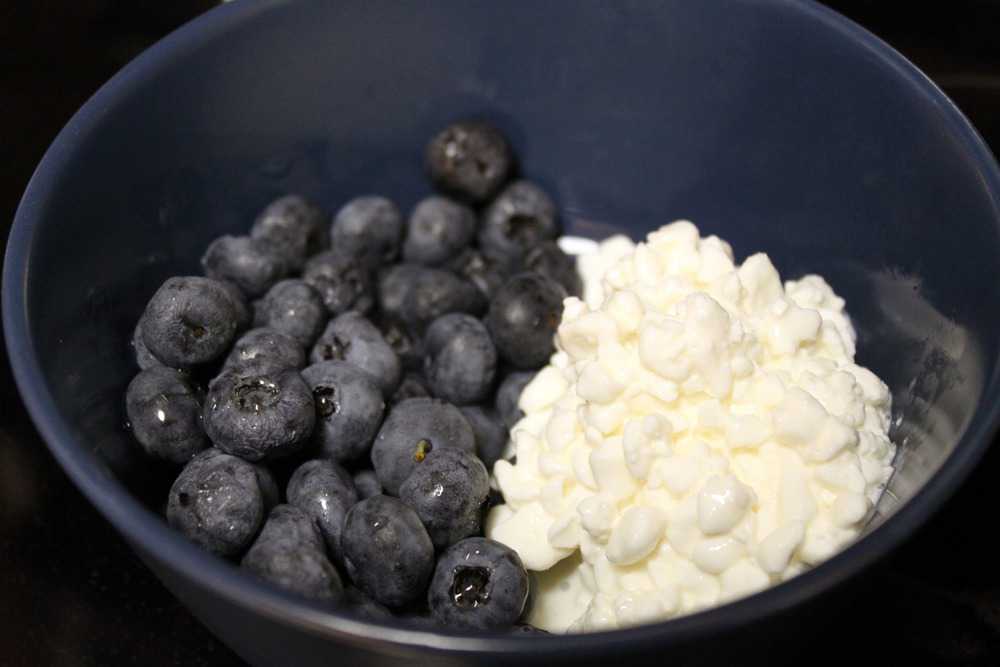
This has been my approach - since doing so I dropped about 15 lbs of bodyfat and added about 5 lbs of muscle - and when I want to build a little more muscle, I just add a little complex carbs at the mid-day meal.
My standard breakfast is 2 cups of low-fat (2%) cottage cheese with two cups of mixed dark cherries and blueberries (both frozen), and 5 gram of creatine. This totals up to about 750 calories and 56 grams of protein, with a lot healthy antioxidants and some fiber (around 10 grams).
Most days, however, aside from an apple later in the day as a snack (with protein-enriched peanut butter), the carbs from the berries and cherries are the only carbs I eat in the day.
Here is the full abstract and citation for this article:Start The Day With A Protein-Rich Breakfast To Reduce Food Cravings, Prevent Overeating Later
A University of Missouri researcher has found that eating a healthy breakfast, especially one high in protein, increases satiety and reduces hunger throughout the day. In addition, using functional magnetic resonance imaging (fMRI) the researchers found that eating a protein-rich breakfast reduces the brain signals controlling food motivation and reward-driven eating behavior.
"Everyone knows that eating breakfast is important, but many people still don't make it a priority," said Heather Leidy, assistant professor in the MU Department of Nutrition and Exercise Physiology. "This research provides additional evidence that breakfast is a valuable strategy to control appetite and regulate food intake."
In the study, Leidy assessed physiological hunger and satiety by measuring perceived appetite sensations and hormonal markers in combination with psychological reward-driven motivation to eat, using fMRI to identify brain activation in specific regions related to food motivation and reward.
The researchers decided to target 'breakfast-skipping' teens for two reasons, Leidy said. First, breakfast skipping has been strongly associated with unhealthy snacking, overeating (especially at night), weight gain and obesity. Second, approximately 60 percent of adolescents skip breakfast on a daily basis.
For three weeks, the teens either continued to skip breakfast or consumed 500-calorie breakfast meals containing cereal and milk (which contained normal quantities of protein) or higher protein meals prepared as Belgium waffles, syrup and yogurt. At the end of each week, the volunteers completed appetite and satiety questionnaires. Right before lunch, the volunteers completed a brain scan, using fMRI, to identify brain activation responses.
Compared to breakfast skipping, both breakfast meals led to increased fullness and reductions in hunger throughout morning. fMRI results showed that brain activation in regions controlling food motivation and reward was reduced prior to lunch time when breakfast was consumed in the morning. Additionally, the higher protein breakfast led to even greater changes in appetite, satiety and reward-driven eating behavior compared to the normal protein breakfast.
"Incorporating a healthy breakfast containing protein-rich foods can be a simple strategy for people to stay satisfied longer, and therefore, be less prone to snacking," Leidy said. "People reach for convenient snack foods to satisfy their hunger between meals, but these foods are almost always high in sugar and fat and add a substantial amount of calories to the diet. These findings suggest that a protein-rich breakfast might be an effective strategy to improve appetite control and prevent overeating in young people."
Notes:
The article, "Neural Responses to Visual Food Stimuli after a Normal vs. Higher Protein Breakfast in Breakfast-Skipping Teens..." has recently been published online in Obesity. The Department of Nutrition and Exercise Physiology is a joint effort by MU's College of Agriculture, Food and Natural Resources, College of Human Environmental Sciences, and School of Medicine. Funding for the research was provided by the National Institutes of Health.
Neural Responses to Visual Food Stimuli After a Normal vs. Higher Protein Breakfast in Breakfast-Skipping Teens: A Pilot fMRI Study.
Source
1] Department of Dietetics & Nutrition, University of Kansas Medical Center, Kansas City, Kansas, USA [2] Department of Nutrition & Exercise Physiology, University of Missouri, Columbia, Missouri, USA.
Abstract
This functional magnetic resonance imaging (fMRI) pilot study identified whether breakfast consumption would alter the neural activity in brain regions associated with food motivation and reward in overweight "breakfast skipping" (BS) adolescent girls and examined whether increased protein at breakfast would lead to additional alterations. Ten girls (Age: 15 ± 1 years; BMI percentile 93 ± 1%; BS 5 ± 1×/week) completed 3 testing days. Following the BS day, the participants were provided with, in randomized order, normal protein (NP; 18 ± 1 g protein) or higher protein (HP; 50 ± 1 g protein) breakfast meals to consume at home for 6 days. On day 7 of each pattern, the participants came to the laboratory to consume their respective breakfast followed by appetite questionnaires and an fMRI brain scan to identify brain activation responses to viewing food vs. nonfood images prior to lunch. Breakfast consumption led to enduring (i.e., 3-h post breakfast) reductions in neural activation in the hippocampus, amygdala, cingulate, and parahippocampus vs. BS. HP led to enduring reductions in insula and middle prefrontal cortex activation vs. NP. Hippocampal, amygdala, cingulate, and insular activations were correlated with appetite and inversely correlated with satiety. In summary, the addition of breakfast led to alterations in brain activation in regions previously associated with food motivation and reward with additional alterations following the higher-protein breakfast. These data suggest that increased dietary protein at breakfast might be a beneficial strategy to reduce reward-driven eating behavior in overweight teen girls. Due to the small sample size, caution is warranted when interpreting these preliminary findings.
Leidy HJ, Lepping RJ, Savage CR, Harris CT. (2011, May 5). Neural Responses to Visual Food Stimuli After a Normal vs. Higher Protein Breakfast in Breakfast-Skipping Teens: A Pilot fMRI Study. Obesity, Volume 19, Issue 6 [Epub ahead of print].
No comments:
Post a Comment